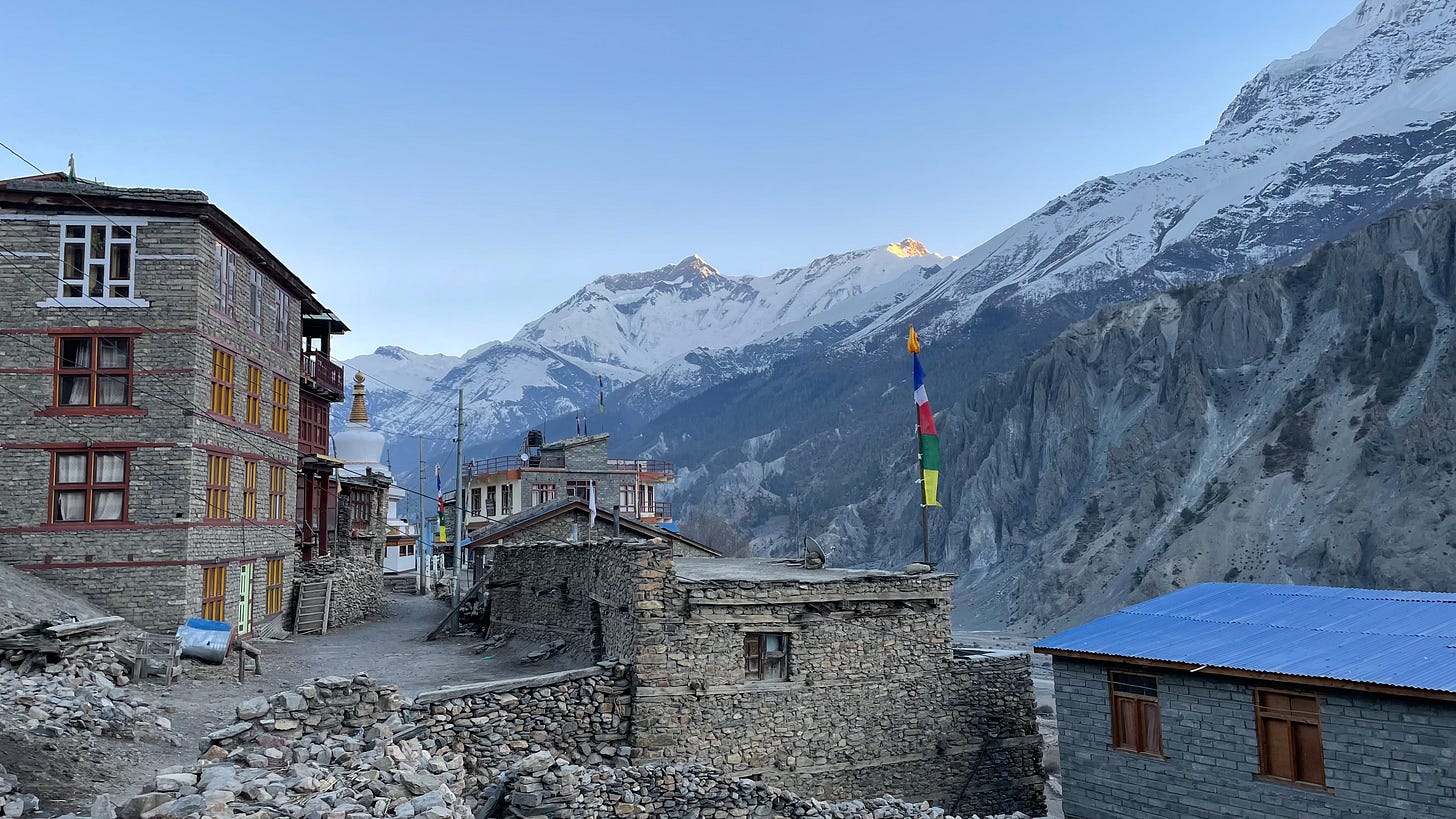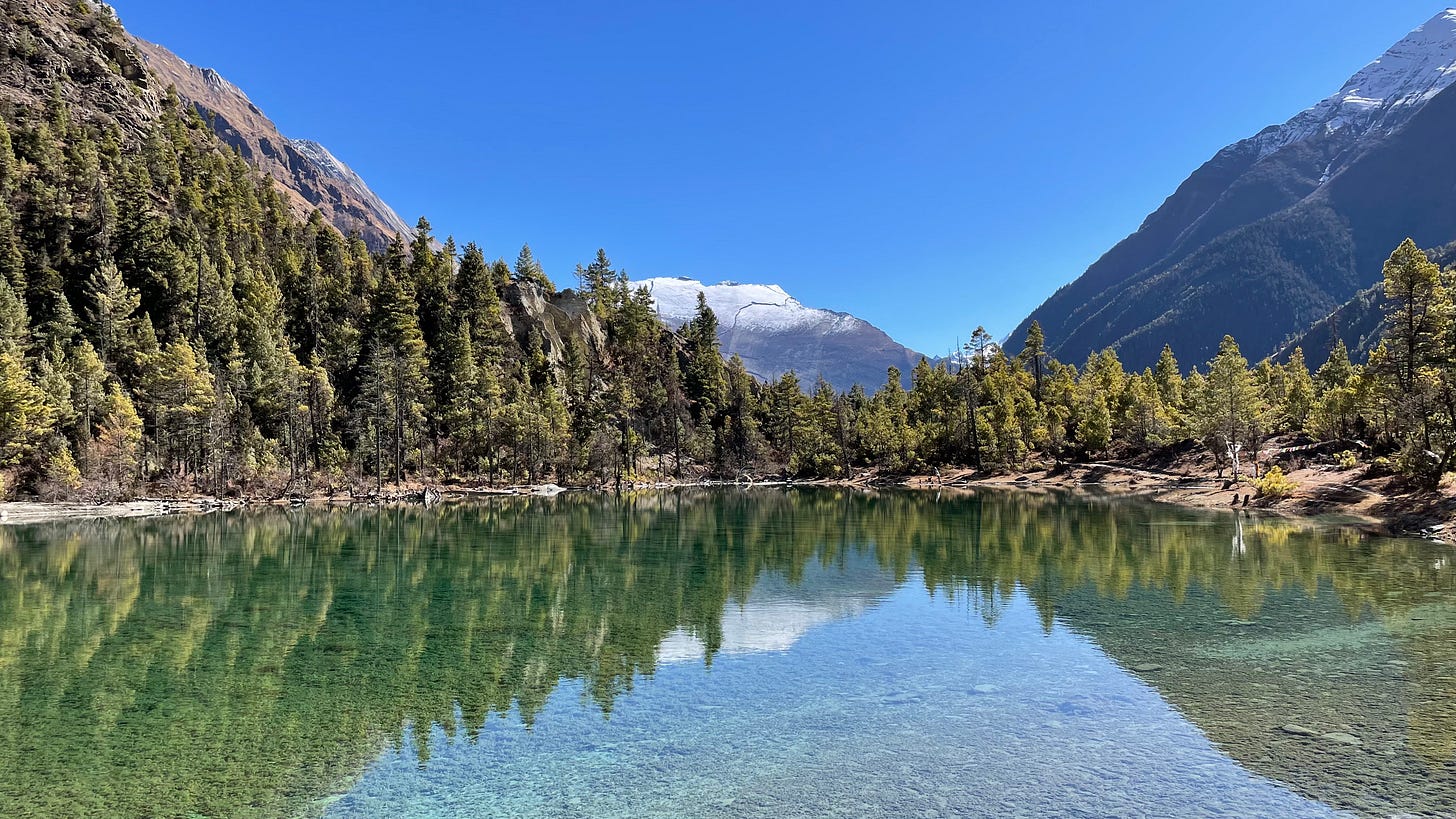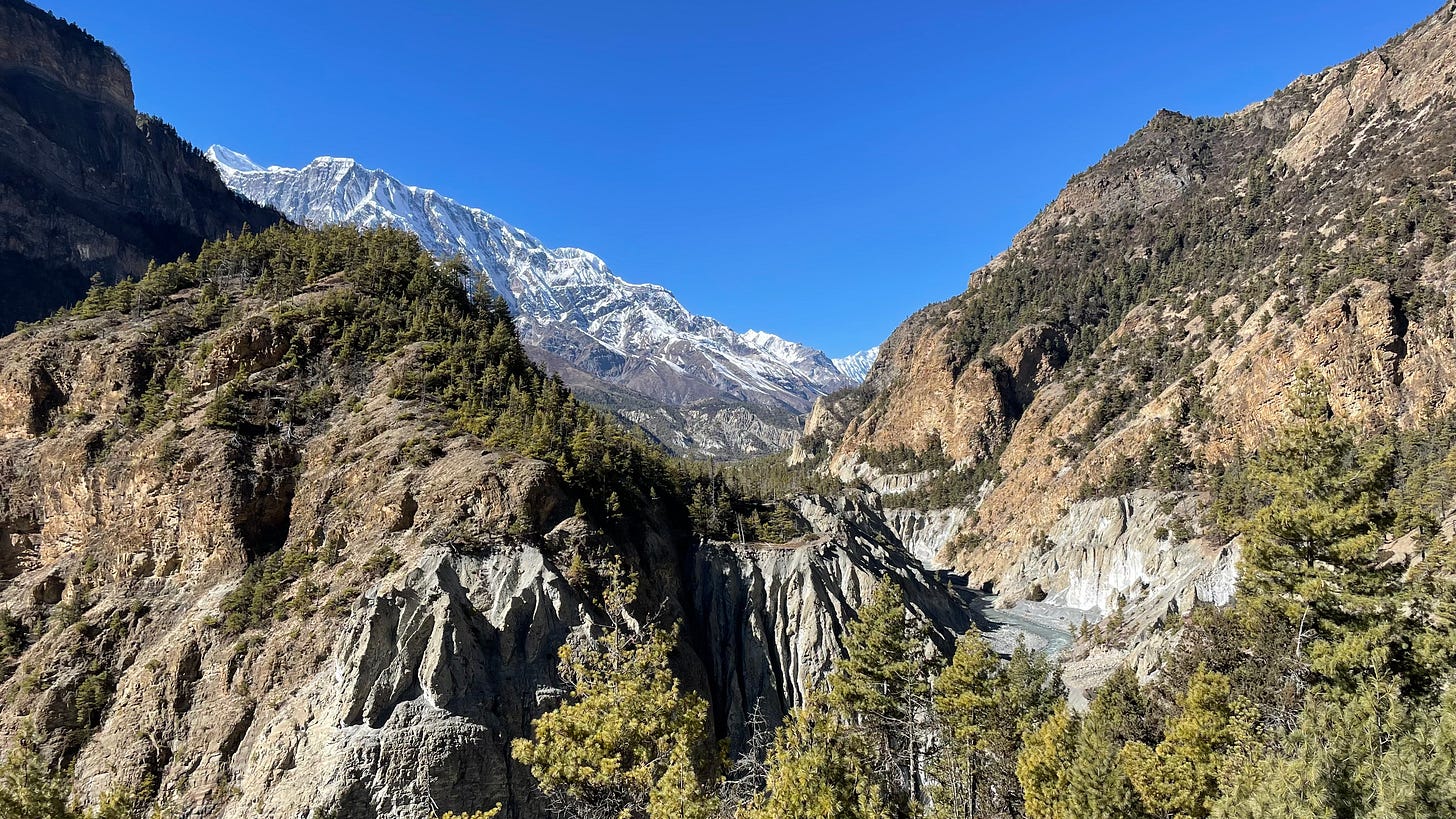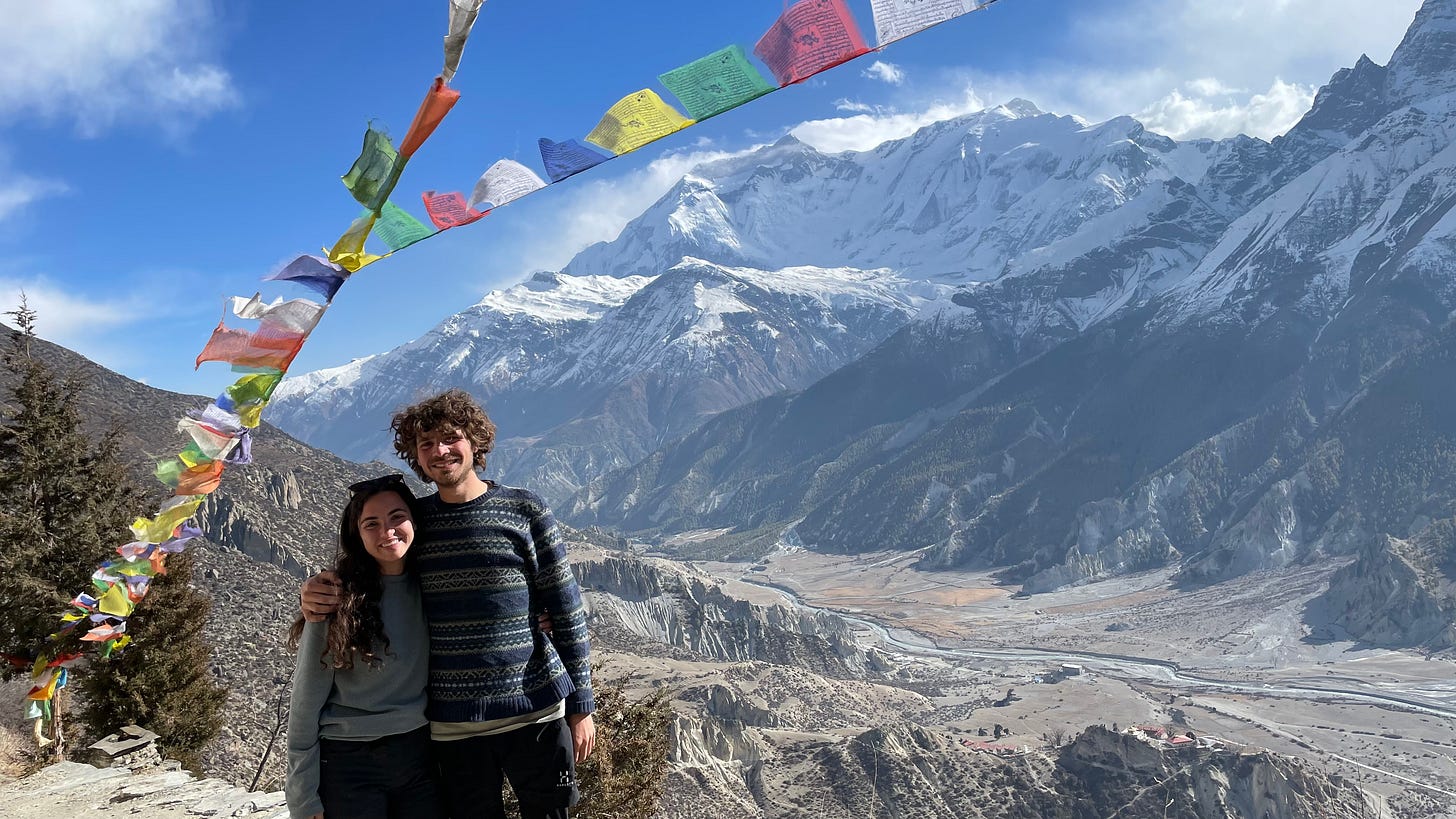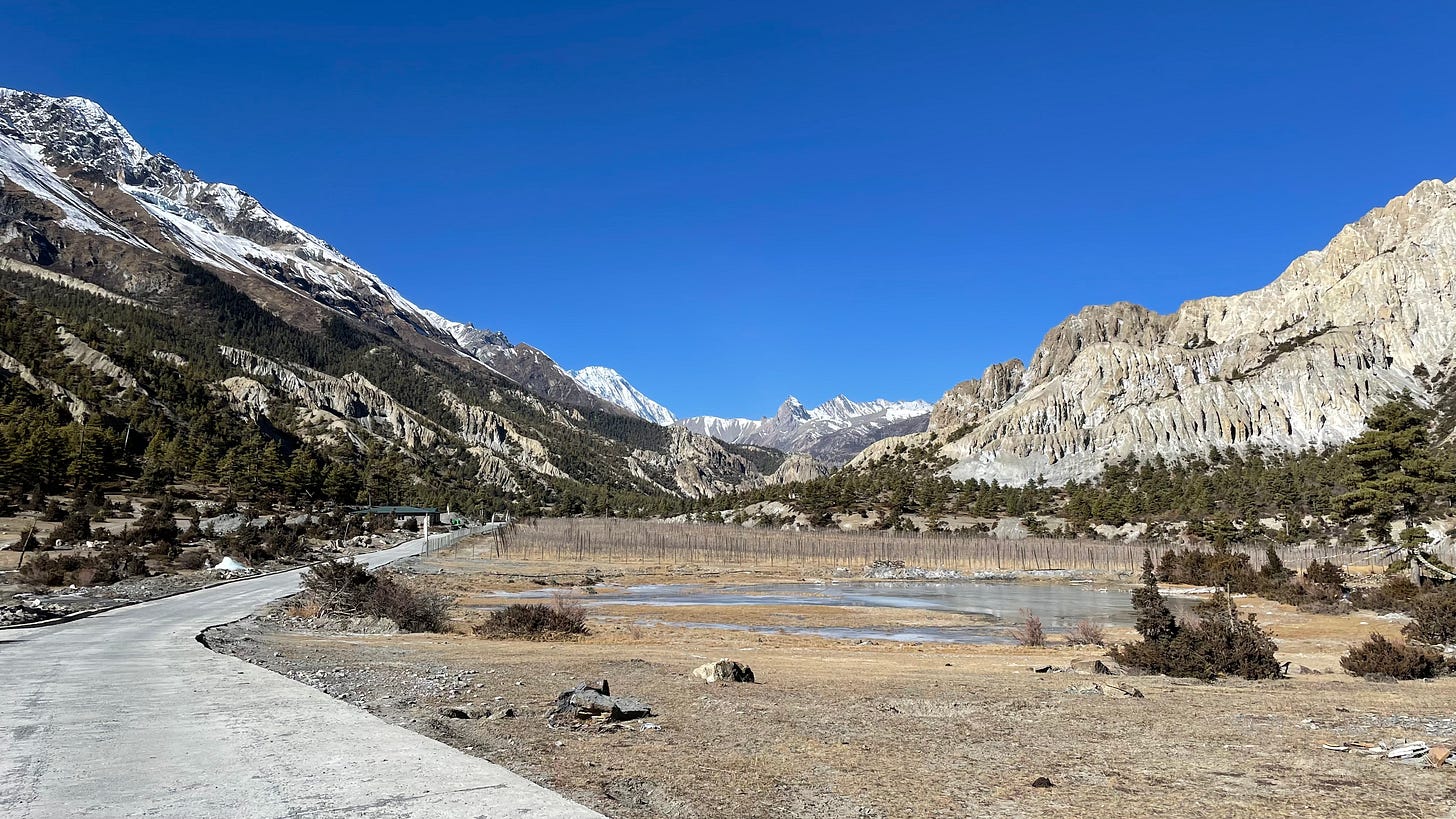“But if we don’t leave, brother, how we gon come back?”
-Rahul Bhattacharya, The Sly Company of People Who Care
The trek didn’t get off to a perfect start. After taking the bus from Pokhara with my friend and trekking partner Alyssa, we decided to take a jeep part way up the road in order to be able to trek further in less time. On hearing the price, we tried to bargain with the driver (a man who looked like he had brought his personal stylist photos of Ben Stiller in Dodgeball and XXXTentacion and asked to combine the two looks) but found he wouldn’t budge. After sitting by the road and waiting until he found enough people to fill the car, he offered us a discounted price to sit in the back bed of the truck. We took it.
The road was so bumpy and the inside of the jeep so full that sitting outside probably wasn’t that much more uncomfortable than sitting inside. At first, we actually enjoyed the fresh air and sunlight, and the views were nice from the large bag of meat that I was sitting on. One of the biggest annoyances was that, every hour or so, the driver would stop and tell us to get out and walk past the police checkpoint around the corner, pretending like we hadn’t just been riding in the back of the car. But as it started to get dark and cold, the driving seemed to get faster and the road seemed to get bumpier, and by the time we arrived, about seven hours after we’d left, I wasn’t hungry for dinner.
As we started walking the next day, I found that my appetite still hadn’t quite returned, a common symptom of mild altitude sickness. We were moving relatively slowly—both because we had planned the trek that way and because Alyssa was still technically working, and had to put a few hours in here and there. The trails were fairly mellow, but the sun was setting early, and once it went behind the mountains it got very cold very fast, so we tried to get in early. But after we went up a big hill to about 3,700 m (12,000 ft) on the third day and both started feeling a little bit sick, we got a bit worried about the altitude and decided to backtrack for a day. Luckily, we woke up the next day feeling fine and were able to continue.
The trail was beautiful, winding its way up through a river valley spotted with trees, and the weather stayed crisp and clear the whole time—which was good, because it was cold enough to threaten snow. We were on the northern side of the Annapurna massif, and the land slowly got drier as we made our way up, green hills crumbling here and there into patches of the sandy, eroded pillars typical of southern Tibetan desert topography. The villages we passed through were not built just for tourists, but had rows of traditional flat-roofed stone houses and monasteries in the hills above, though many of them were empty, residents having moved to lower altitudes for the winter. The buildings blended right in, white stupas and brightly flapping prayer flags the only things standing out in the arid landscape.
I hadn’t thought that I would be able because of the cold, but I was really grateful to be able to do one last trek before leaving. Even when I was ordering soup for dinner and couldn’t manage more than three bites, even stressing out about finding a ride back down to Kathmandu and having enough time to get ready before my flight, I knew that I was where I wanted to be. I loved seeing a new place, one that felt so different from other places I’ve seen in Nepal in so many ways: the landscape, the people, the culture. I felt an overwhelming peace there, one that I couldn’t deny, sitting with the mountains one last time, not knowing the next time I might be able to see them again.
And I felt so lucky to be able to be there with Alyssa, a new friend who I met just a little too late. Sometimes, when you’re traveling, you meet people who just seem to fit: you understand each other, you enjoy each other’s company, and you can’t help but to feel sad that you only have so much time together. Alyssa was exactly that kind of person, one who I wish I had met much earlier on, someone who was fun to be with, kind and understanding to talk to, and knew the context of my life from having lived in Nepal for a few months herself. In a place where I have felt alone for so long, companionship is a blessed refuge, but a genuine friend is perhaps the greatest gift that I could have asked for.
Getting back to the city, I hardly had a moment to myself, and that’s exactly how I wanted it to be. I was in a little whirlwind, touching down all over the city, packing up my bags one moment and then zooming across town to get some last-minute gifts the next. My host family was confused about why I was spending so much time out of the house, what I could possibly be doing every day. It all kept me so busy that I hardly had time to realize that I was even leaving, and I was more than happy for it to be that way.
My last full day was the single most beautiful day that I’ve had in Kathmandu. The sky was completely clear, and for some reason I’ll never know (I know better than to ask why after ten months here), there was much less dust in the air than usual, and the mountains were visible from all over the city in their full glory. I caught motorbike after motorbike to meet up with the few and lovely people I’ve come to know and call true friends, to say goodbye over dal bhat, momos, tea, to watch the sun set on the Himalayas and my time in Nepal.
My family all dealt with saying goodbye in different ways. My host parents, aunts and uncles all said to me, in what I’ve come to understand is typical Nepali fashion, “you’re leaving? And you’re not coming back? You’re going to forget us?” I spent the majority of my goodbye conversations with adults repeating the same lines: I am leaving, but I will come back, I just don’t know when, and I will call or text from time to time. My brothers, on the other hand, asked dolefully if I could move my flight and stay just a few days longer for the bhoj this week.
I don’t consider myself very good at goodbyes, but even weirder was the feeling of not being able to say goodbye. In the end, because I returned to Kathmandu with so few days before my flight, there were some people that I didn’t get the chance to see, and that left me feeling incomplete as I departed. I never got to thank the women of Tahnani Dapha Khalah (the music group that I joined on occasion) for their incredible warmth and kindness towards me, and I could only thank my friend Pushpa, who introduced me to them, over text. And I never was able to say goodbye to my school in person, so I did what I could and left a note in the teachers’ room to be read to all the teachers and students, but it broke my heart.
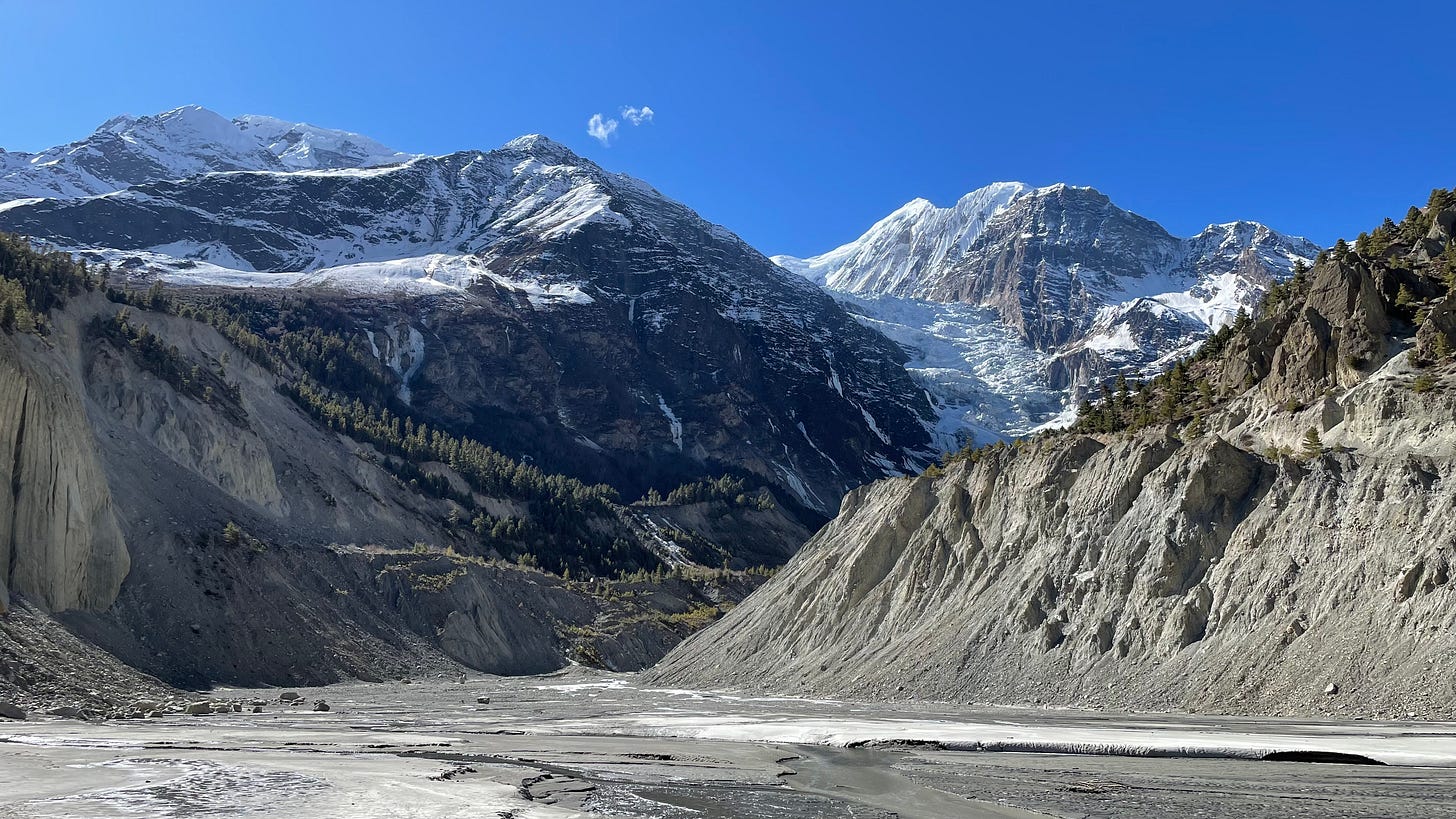
The truth is, despite all of these sadnesses, I felt ready to leave. It was difficult to say goodbye, yes, and there are many people and things that I will miss, but the hardships that I faced living in Nepal are still fresh, and the scales can’t be tipped so easily. I never was able to change my own mind about Kathmandu, and I can say without a doubt that I was thrilled to leave the city, with its crowds and traffic and pollution and loneliness. Deep down, my sadness about leaving was not just about saying goodbye to people but something a little more selfish and complex, a sort of melancholy reflection on the past ten months, knowing that it wasn’t really what I wanted, wishing that it had gone differently, and, sometimes, wondering if I should have come to Nepal at all.
Even as I was going through the motions of leaving, I knew inside that it was time to go, and I could feel the thought of returning home to my own family and friends who I love so dearly pulling on my heart. I know I will always have a place in Nepal, and I doubt my travels here are over for good, but they are over for now, and that’s okay. It will take time, but there are always things to be grateful for, though I might not know what they are for a while. For now, I am trying to hold the happy with the sad, to accept how I’m feeling without regret: the best parts of my time here don’t make my heartache any easier to bear, but neither do the worst parts diminish my love. There’s always both—that’s just life, isn’t it?
And how else was it going to end?
With my return to Kathmandu just three days before my departure, of course, running around the city in my own cloud of chaos, picking things up and dropping things off, packing my bags and saying goodbye to friends, but even then not being able to see all of them.
With too much food for breakfast, a tika and a khata and a topi from grandma, my family and my cousins packed into a tiny car that smelled like ghee, my uncle who didn’t know how to get to the airport pulling into dead-end streets and turning around.
With photos in every possible permutation, Aarash hiding behind his mom when it was his turn to hug me, getting into line and turning around to see tears flowing freely.
With a goodbye and a wave and a weepy smile, a step into the airport and out of Nepal.
And how else was it going to end?
Until next time: peace!
Much love,
Oren



